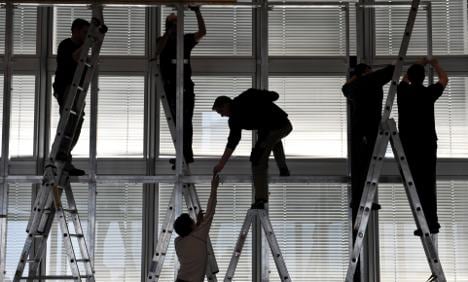The government is pencilling in growth of 0.8 percent for 2012, marginally more than an earlier forecast for 0.7 percent.
But Europe’s top economy will grow by only 1.0 percent next year, instead of the 1.6 percent Berlin had previously been hoping for, Rösler said.
“The good news is that the German economy is holding up and still on a growth path, despite all the global economic turbulence,” Rösler told a news conference.
Germany’s economic performance in the first six months of this year had turned out better than thought, the minister said.
“But with the European sovereign debt crisis and the economic weakening in developing countries in Asia and Latin America, Germany is in stormy economic waters,” he cautioned.
Companies were holding back on planned investments and the majority of sentiment indicators pointed to a weakening of growth.
“We’re therefore expecting a lessening of economic momentum in the winter half-year. But there can be no talk of a collapse in growth,” Rösler insisted.
“The German economy remains robust and has stands on a structurally sound basis. There is every indication that the global economy can regain momentum and that means growth will pick up in Germany, too,” Rösler said.
Last week, Germany’s leading economic think tanks pared back their forecast for this year to 0.8 percent and slashed the prediction for next year in half to 1.0 percent, warning there was a “great danger” that Europe’s top economy could fall into recession.
Chancellor Angela Merkel, too, acknowledged that after two “very good” years of growth, this year would be “weaker.”
German gross domestic product (GDP) expanded by 4.2 percent in 2010 and by 3.0 percent in 2011.
Rösler said the outlook for the German market remains “very favourable, even if it is losing momentum.”
Employment in Germany was already at record levels and was expected to rise further next year when some 41.6 million people were projected to have a job.
At the same time, the annual average jobless total was expected to fall to 2.9 million this year and remain at that level next year, Rösler said.
With purchasing power set to rise as inflation remains at around 2.0 percent this year and 1.9 percent next year, household spending “will remain the main driver of growth,” the minister continued.
Export growth, traditionally the motor of the German economy, has slowed sharply since last year owing to the global economic weakening, but remains relatively robust, Rösler said.
AFP/The Local/hc



 Please whitelist us to continue reading.
Please whitelist us to continue reading.
Member comments